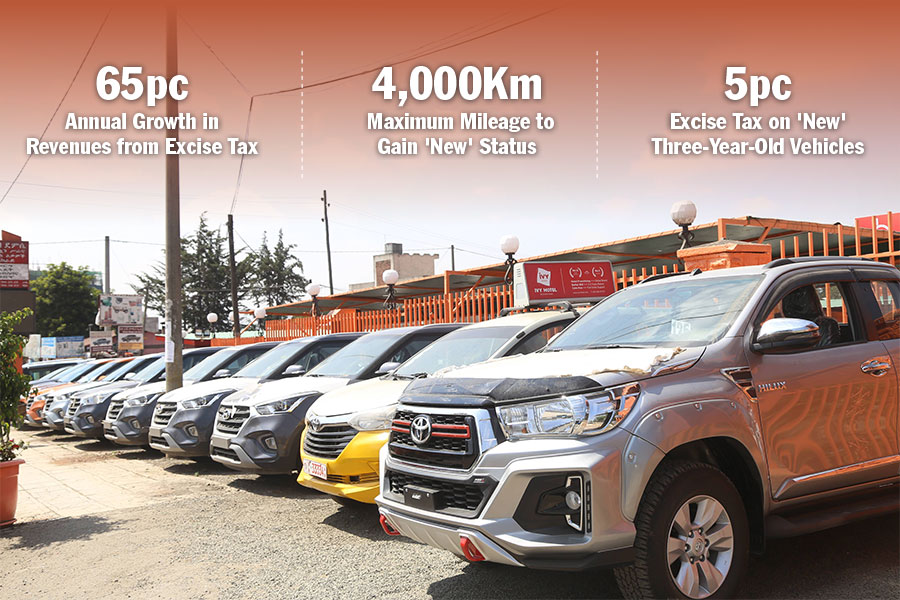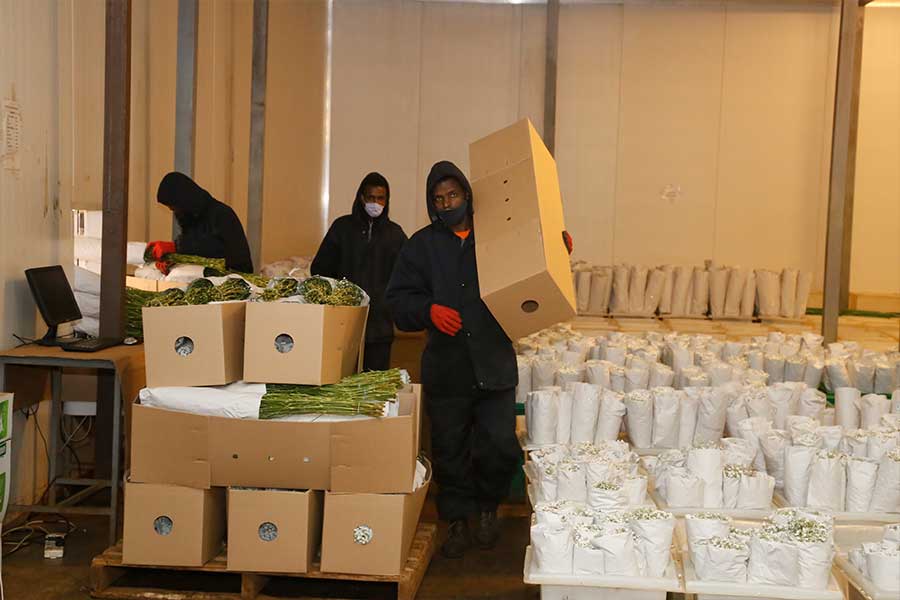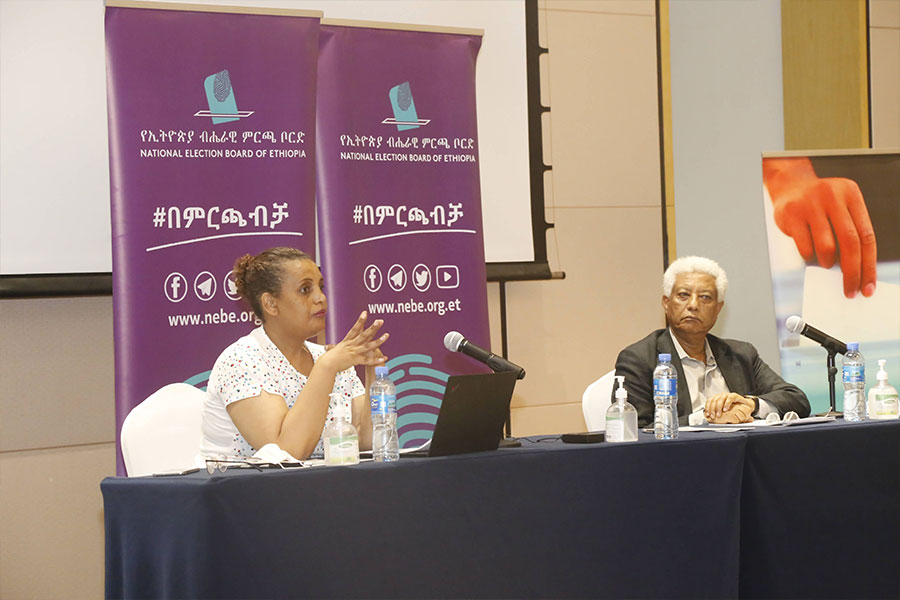
When Abdella Mohammed, 35, moved to China, he was a teenager, sent by his family to pursue an education in international business management. He spent 18 years there, most the time in Shanghai, working for a medical equipment manufacturer after finishing school. Three years ago, Abdella returned with grand plans of establishing a medical textile manufacturing plant, inside Meqelle Industrial Park, in partnership with two Chinese businessmen.
Things started smooth. Their company, Royal Medical Textile Manufacturing Plc, rented a 3,000sqm space inside the Park for 6,000 dollars a month. With a total investment of almost eight million dollars, equipment and machinery were imported and installed. They were about to plug the socket in and begin production.
Ironically, the onset of the COVID-19 pandemic meant that a company set to begin producing personal protective equipment, in high demand due to the virus, could not get off the ground. Travel restrictions and lockdowns in China prevented Abdella's partners from making the trip to Ethiopia. The plant in Meqelle never started production.
In April 2020, a state of emergency was declared, schools were closed, large gatherings were prohibited, and a sharp sense of cautiousness had gripped the country. With its plans disrupted, the company leased another space in Kilinto Industrial Park in the outskirts of Addis Abeba. Though the new space was smaller, 1,000sqm for 2,000 dollars a month, the manufacturer raced to begin producing an item in high demand – face masks.
When production started at the Kilinto plant in September that year, around six months following the first recorded case of COVID-19 in the country, the pandemic had already taken the lives of 1,000 people. Individuals were not allowed entry into banks, public offices or transportation without wearing face masks. All this was positive for Abdella and Royal; the company continued to rake in the cash as the pandemic went from bad to worse.
With 136 employees, Royal Medical churned out masks at around half of 1.5 million daily production capacity. By late 2020, Royal sold as many as 700,000 masks a day at a unit price of 1.8 Br to dozens of pharmacies, a handful of government offices and agents in Mercato. Pretty soon, it became normal to see youths hawking them on the roads of Addis Abeba. Royal's light blue masks, in particular, were ubiquitous.
Royal is not the only business born from the ruins of the COVID-19 pandemic.
Many establishments have capitalised on what has been a highly disruptive phenomenon for almost all sectors of the economy. Producers of sanitiser and providers of disinfectant services have also benefited from the opportunities presented by the pandemic. The volume of sanitiser produced domestically jumped from 480,000lt to 12 million litres last year while the number of manufacturers producing face masks grew from just three to over 50, according to data from the Ministry of Trade & Industry.
The figures are impressive but the opportunities were proven to be short-lived. Somewhere along the line, demand slumped.
In late 2020, the government lifted the state of emergency, loosened restrictions on public gatherings, and reopened schools to curb the negative effects the pandemic was having on the economy. Taking place against a backdrop of the unbearable impacts of the pandemic, Ethiopia's economic growth plummeted to just two percent in the year after COVID-19, according to the IMF.
A lack of demand for face masks and issues with sourcing raw materials have forced Royal Medical Textiles Manufacturing Plc, which opened a plant in Kilinto Industrial Park last year, to lay off almost 40 employees.
The relaxing of restrictions was welcome news to many and allowed things to go as far back to normal as possible, but it came with its own consequences. As the public sank back into its usual routines, protocols and caution were casually thrown to the wind. It was a measure that surfaced in contrast to the number of the sick and dying, which were not showing any signs of slowing down.
By the end of last year, almost 10 months into the pandemic, around 125,000 cases and almost 2,000 deaths had been recorded. The number of cases has tripled, while casualties from the virus have doubled since then. Crowds began to gather, students went back to school, and demand for personal protective materials like face masks and sanitisers, as well as disinfection services, began to drop. It hurt businesses and individuals involved in the market.
Noah Yemam, 32, a pharmacist and employee of Ami Pharmacy in the Lancia neighbourhood, is one of those affected.
In March 2020 and the months following, people were flocking to his pharmacy to buy face masks and sanitiser. As the number of cases and the death count continued to climb, protective equipment continued to fly off the shelves.
“I was selling up to 60 cartons of masks a day, charging up to 20 Br for a single mask," Noah said.
Each carton contained 50 face masks. On some days, the pharmacy sold as much as 60lt of sanitiser. Not anymore. Barely a customer walks in asking for face masks; a whole day goes by without selling a single mask. Sanitiser sales are even more discouraging.
"Maybe one customer bought sanitiser last week," Noah recalled.
Tafesse Bekele, 23, works as a parking attendant in the Lancia neighbourhood. To him, sanitiser is nothing more than a waste of money, especially considering the meagre income he makes from his job.
"It's been months since I used any sanitiser," says Tafesse, adding that he does, however, use a face mask when boarding public transportation though he only buys one or two of them a week.
The fall in demand has also affected Spotless Cleaning Services, whose revenues were boosted by providing disinfection services. It was established in late 2019, just months before the first COVID-19 case was recorded in the country.
At first, Spotless provided only regular cleaning services, operating with a handful of employees. Before long, it had added disinfection to its milieu as more and more people were asking for an extra layer of protection against the virus. Spotless quickly adapted and began door-to-door services, disinfecting residences and offices alike, charging between 10 Br and 15 Br a square metre. Engulfed by the demand, the company had hired dozens of part-time employees.
However, calls from clients looking for disinfection services have effectively ceased to come in for Spotless over the last three months. It has returned to providing regular cleaning services, said Abel Solomon, general manager and founder at Spotless.
Even after the Ministry of Health reported the third wave of COVID-19, the situation is far from improving.
The demand for face masks and other personal protective materials plummeted. Institutions that used to buy personal protective equipment in bulk have stopped altogether, forcing manufacturers like Royal to lower production and lay off employees.
This goes back to manufacturers such as Royal, left with over eight million masks in stock. Orders are far and few in between, Abdella told Fortune.
Royal laid off close to 40 employees as productivity plummeted drastically.
Global demand for personal protective equipment, including masks and sanitiser, jumped by up to 400pc in the one year beginning 2019, according to a joint study conducted by UK-Aid and Great for Growth, a non-governmental organisation. The increase was driven by a boost in consumption by the public and in non-healthcare work settings. The study disclosed that the peak demand is likely to continue throughout 2021, though it is predicted to fall sharply in 2022 as consumption from both these groups is expected to plunge.
Contrary to the global trend, the pace of the fall in demand for personal protective equipment is seemingly sudden in Ethiopia, forcing manufacturers to shift their business.
Blue Cleaning Services, established in late 2019 as a door-to-door provider, illustrates this shift. Much like Spotless, Blue had seen success in the early days of the pandemic, providing its service to hospitals, offices and real estate companies with 13 employees. The company also took to producing and selling up to 50 litres a day to clients.
As time went by, fewer calls were coming in, and the company shifted to the production of detergents and reverted back to providing basic cleaning services.
"We saw the business was dying," said Kaleb Habte, a shareholder of Blue Cleaning. "We had to make the shift."
Marketing experts advise other establishments to follow suit.
Ermias Teshome is a marketing and communications consultant. He urged COVID-19 dependent businesses to take stock of their resources and reconsider their operations.
"The companies can conduct research and shift to other lines of business," Ermias says. "But it has to be related to the resources on hand and the linkages they have created to source inputs."
For now, Royal has no plans to make a shift though it is facing some challenges. It sells one face mask for almost five Birr, over double what it went for in the early days of production.
"We're considering an advertisement campaign on TV and radio," said Abdela, hoping this will do the trick in getting millions of masks off the company's shelves.
The decline of these pandemic-born businesses should be alarming to the public, as it reflects a fall in vigilance and precaution. The country is currently in the grip of another COVID-19 wave, with the number of cases and deaths spiking to levels last seen during the pandemic's peak in April this year. With the death toll fast approaching 5,000, members of the public are growing complacent.
Shimeles Berhanu, a 22-year-old student, says he has been using sanitiser and face masks less often since he received the first dose of the AstraZeneca vaccine a couple of months ago. Although he carries a small bottle of sanitiser and a face mask in his pocket, he uses them sparingly, usually when entering crowded places.
"The mask is suffocating," says Shimeles.
PUBLISHED ON
Sep 04,2021 [ VOL
22 , NO
1114]

Viewpoints | Jan 03,2021

Fortune News | Dec 11,2021

Fortune News | Jul 24,2021

Fortune News | Mar 05,2022

News Analysis | Jun 19,2021

Dec 22 , 2024 . By TIZITA SHEWAFERAW
Charged with transforming colossal state-owned enterprises into modern and competitiv...

Aug 18 , 2024 . By AKSAH ITALO
Although predictable Yonas Zerihun's job in the ride-hailing service is not immune to...

Jul 28 , 2024 . By TIZITA SHEWAFERAW
Unhabitual, perhaps too many, Samuel Gebreyohannes, 38, used to occasionally enjoy a couple of beers at breakfast. However, he recently swit...

Jul 13 , 2024 . By AKSAH ITALO
Investors who rely on tractors, trucks, and field vehicles for commuting, transporting commodities, and f...

Jul 12 , 2025
Political leaders and their policy advisors often promise great leaps forward, yet th...

Jul 5 , 2025
Six years ago, Ethiopia was the darling of international liberal commentators. A year...

Jun 28 , 2025
Meseret Damtie, the assertive auditor general, has never been shy about naming names...

Jun 21 , 2025
A well-worn adage says, “Budget is not destiny, but it is direction.” Examining t...